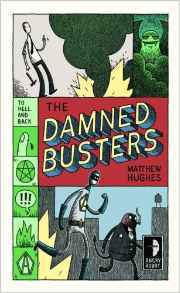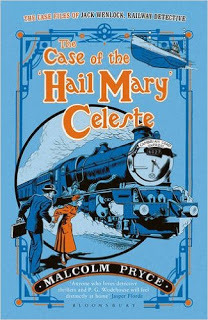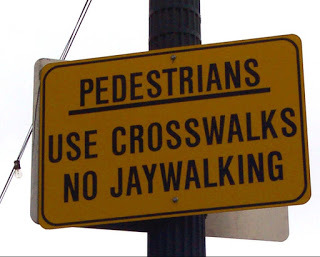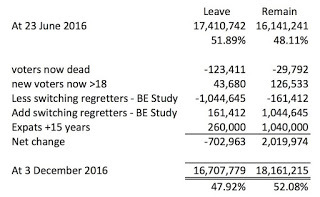Brian Clegg's Blog, page 46
January 3, 2017
The Damned Busters review
 The Damned Busters follows in a noble tradition of humorous fantasies in which someone gets one over on the devil when entering into a pact - such stories follow on from what seems to be a very early form of fantasy story with a number of legends (usually explaining odd landmarks) using this plot line.
The Damned Busters follows in a noble tradition of humorous fantasies in which someone gets one over on the devil when entering into a pact - such stories follow on from what seems to be a very early form of fantasy story with a number of legends (usually explaining odd landmarks) using this plot line.In Matthew Hughes' novel, comic-book obsessed Chesney Artstruther, an actuary on the high functioning end of the autism spectrum. accidentally summons a demon. His refusal to accept a pact results in a strike in Hell, which leads to Satan agreeing to allow Chesney demon-powered super abilities in exchange for ending the strike.
Altogether this works reasonably well - Hughes has some clever twists on the pact with the devil riff, and keeps us engaged, even though the female characters are very old-fashioned: the overbearing mother, the girl he loves who is beautiful but shallow and the girl he will end up with who is bright and sassy. The writing style is good but sits slightly oddly with the setting - I assumed Hughes was English (he's actually Canadian) because the way it is written feels like an outsider's view of the US.
The ending is somewhat unsatisfying too, fixing a local problem but clearly leading on to further books (there's a trilogy). And compared with the greats of this genre there really isn't enough made of the limitations that come with such pacts. Chesney's assistant demon seems pretty much lacking in demonic qualities and is a nice guy really, while the open-endedness of the pact itself allows for far too much deus ex machina in the plotting. However, the underlying concepts of the rebellion in Hell and of the idea that existence is a story still being written are genuinely interesting, so it may be worth continuing to volumes 2 and 3.
The Damned Busters is available from amazon.co.uk and amazon.com.
Published on January 03, 2017 01:27
December 30, 2016
The Case of the 'Hail Mary' Celeste review
 Malcolm Pryce is rightly known for his wonderful novels setting a Sam Spade-like, world-weary detective in the hell-hole of crime that is Aberystwyth, with druids as gangsters and good time girls in Welsh national costume. In these books, Pryce creates a fantasy world that is totally bonkers, and yet works remarkably well. His new creation, the railway detective Jack Wenlock, might seem at first glance to be more of the same - and the book does have some of the same kind of absurdity with, for example, a group of nuns who go mysteriously go missing from a train and rampage across Africa - but 'Hail Mary' Celeste is several degrees closer to reality than the Aberystwyth books, and both benefits and loses from this.
Malcolm Pryce is rightly known for his wonderful novels setting a Sam Spade-like, world-weary detective in the hell-hole of crime that is Aberystwyth, with druids as gangsters and good time girls in Welsh national costume. In these books, Pryce creates a fantasy world that is totally bonkers, and yet works remarkably well. His new creation, the railway detective Jack Wenlock, might seem at first glance to be more of the same - and the book does have some of the same kind of absurdity with, for example, a group of nuns who go mysteriously go missing from a train and rampage across Africa - but 'Hail Mary' Celeste is several degrees closer to reality than the Aberystwyth books, and both benefits and loses from this.The plus side is Pryce's affection for the Great Western Railway. His lead character might be odd in the extreme, but it's hard not share some of Wenlock's love for the old-fashioned ideals of the railway (admittedly without being given a mother fixation on a locomotive). Pryce captures the emotional intensity that the railways have held for some, even giving a bit part to a young Doctor Beeching, already a hater of the railways, and culminating with an appendix to the book that lists over 2,000 stations that Beeching recommended closing in his report - this has the same kind of nostalgic heart-pull as that Flanders and Swann song that lists some of the evocative station names that were closed.
There's also more character development here than in the Aberystwyth books, where most of the players are set in aspic. This is a story of lost innocence - Wenlock begins by believing that the state and the powers that be are caring benefactors, but comes to realise that they ruthlessly take an 'end justifies the means' approach. At the same time he goes from being a child emotionally to understanding love for the first time. I also truly delighted in some of the details in the interspersed excerpts from the '1931 Gosling Annual', particular the 'Answers to readers' letters', where we never see what was written, but from the answers it seems the readers mostly wanted to create mayhem and murder.
In some ways, then, this is a book with a closer attachment to reality than Pryce's earlier novels (the Goslings might not have existed, but a lot of the GWR detail is real) and with stronger character work. And I did very much enjoy it - but for me it lacked the edge of the Aberystwyth books which create a parallel universe that is whole and works on its own merits. In this book the grotesque is half and half with reality, and somehow that made it a little less satisfying. Nonetheless, Pryce has demonstrated once again his mastery of seeing the world differently - and if there are more Jack Wenlock books to come, I look forward to reading them.
The Case of the 'Hail Mary' Celeste is available from amazon.co.uk and amazon.com.
Here's the Flanders and Swann song I was thinking of:
Published on December 30, 2016 01:33
December 27, 2016
Bete - Adam Roberts ****
 For a long time, my taste in science fiction writers was limited to the favourites from my youth. The likes of Asimov, Blish, Brunner, Clarke, Heinlein, Kornbluth and Pohl. About as trendy as I got was Zelazny. But lately I've discovered two who have re-invigorated my love of SF - Iain M. Banks and Adam Roberts, both combining style and entertainment with superb ideas that really make you think.
For a long time, my taste in science fiction writers was limited to the favourites from my youth. The likes of Asimov, Blish, Brunner, Clarke, Heinlein, Kornbluth and Pohl. About as trendy as I got was Zelazny. But lately I've discovered two who have re-invigorated my love of SF - Iain M. Banks and Adam Roberts, both combining style and entertainment with superb ideas that really make you think.The opening of Roberts' novel Bête had me spellbound. The cow that a farmer is about to kill is pleading for its life - and the scene is handled brilliantly. So too are conversations exploring the borderline between AI and consciousness. If an animal is made apparently intelligent by an implanted chip, is it the chip that is intelligent or the animal... or neither?
Some of the rest of the book worked well for me as well. The surreal conversations, packed with popular culture quotes (some of which I got) were fascinating. However, I'm not a great fan of disaster novels - I loved Wyndham as a teenager, but rather grew out of the callousness of the whole concept; the action that takes place throughout Bête is a disaster novel scenario, even if, this being Roberts, it is given all sorts of unexpected twists. So it's my fault, rather than the book's that I was fascinated by that opening scenario and the main character (especially as a friend is an ex-organic dairy farmer), but for me, it would have made a brilliant short story or novella, rather than requiring the rest of the book.
So Bête is not one of my favourite Roberts novels, even though the bits that really got to me comprised some of the best SF writing I've ever seen. Let's be clear, every Roberts novel is worth far more than most post 60s SF - and I strongly encourage anyone who likes science fiction, or the philosophy of AI to read this book. It simply wasn't in my top five.
Bête is available from amazon.co.uk and amazon.com.
Published on December 27, 2016 08:20
December 22, 2016
The Shockwave Rider review *****
[image error]
I've recently re-read one of my favourite SF novels from the 1970s, John Brunner's The Shockwave Rider, and it has more than lived up to expectations.
Okay, like any book using future technology it gets some things wrong. Its early 21st century tech is mostly too advanced (but then they still use tapes to store information). However, this book absolutely sizzles with ideas, some taken from Alvin Toffler's far effective readable futurology book, Future Shock.
Just one example - the protagonist is in the business of creating digital worms to make changes to the net. At the time (1975), not only was ARPANet, the internet's predecessor very limited, the first actual network worm wouldn't be launched for another 13 years (Brunner originated the term in this novel).
Brunner also creates a stunning dystopian society, where the US government/major corporations (hand in hand) manipulate what could in principle be an exercise in effective distributed democracy - the public Delphi boards used to suggest solutions to problems and predict outcomes - to keep the population in check.
There's far more to it than this, and though the ending wraps things up a little too neatly (I'm afraid the bad guys would almost certainly have won), this remains a brilliant net-based SF novel.
Even better it comes here with two other Brunner novels as a bonus. The Traveller in Black is a short fantasy novel - a little vague for my liking, but still rather nicely explains the disappearance of magic from the world. The Sheep Looks Up generally gets better reviews than Shockwave Rider, and it certainly tries to do something more grandiose, but for me it's not as good a story. Even so, it's another example of Brunner doing something original and showing that science fiction should not be confined to a ghetto.
Brunner is now a largely forgotten author, but he really shouldn't be.
The Shockwave Rider is available in the collection John Brunner SF Gateway Omnibus from amazon.co.uk and amazon.com.
Okay, like any book using future technology it gets some things wrong. Its early 21st century tech is mostly too advanced (but then they still use tapes to store information). However, this book absolutely sizzles with ideas, some taken from Alvin Toffler's far effective readable futurology book, Future Shock.
Just one example - the protagonist is in the business of creating digital worms to make changes to the net. At the time (1975), not only was ARPANet, the internet's predecessor very limited, the first actual network worm wouldn't be launched for another 13 years (Brunner originated the term in this novel).
Brunner also creates a stunning dystopian society, where the US government/major corporations (hand in hand) manipulate what could in principle be an exercise in effective distributed democracy - the public Delphi boards used to suggest solutions to problems and predict outcomes - to keep the population in check.
There's far more to it than this, and though the ending wraps things up a little too neatly (I'm afraid the bad guys would almost certainly have won), this remains a brilliant net-based SF novel.
Even better it comes here with two other Brunner novels as a bonus. The Traveller in Black is a short fantasy novel - a little vague for my liking, but still rather nicely explains the disappearance of magic from the world. The Sheep Looks Up generally gets better reviews than Shockwave Rider, and it certainly tries to do something more grandiose, but for me it's not as good a story. Even so, it's another example of Brunner doing something original and showing that science fiction should not be confined to a ghetto.
Brunner is now a largely forgotten author, but he really shouldn't be.
The Shockwave Rider is available in the collection John Brunner SF Gateway Omnibus from amazon.co.uk and amazon.com.
Published on December 22, 2016 08:07
December 21, 2016
Bad food nostalgia
 There are times when I have a little twinge of nostalgia for the times when food in the UK was mostly terrible. These days we relish a huge range of cuisines (though interestingly, by far the majority are non-EU - from Europe only Italian and to some extent Spanish have a significant hold nationwide). But I'm talking about the time when cooking a Vesta curry was the height of exoticism.
There are times when I have a little twinge of nostalgia for the times when food in the UK was mostly terrible. These days we relish a huge range of cuisines (though interestingly, by far the majority are non-EU - from Europe only Italian and to some extent Spanish have a significant hold nationwide). But I'm talking about the time when cooking a Vesta curry was the height of exoticism. This was all brought back to me by an advert I've just seen for a range of frozen roast dinners. They have one unifying theme. It's not the high quality meat. It's not the beautifully cooked vegetables. It's the fact that they're all smothered in the uniform, brown-flavoured gravy of my youth, Bisto.
This was all brought back to me by an advert I've just seen for a range of frozen roast dinners. They have one unifying theme. It's not the high quality meat. It's not the beautifully cooked vegetables. It's the fact that they're all smothered in the uniform, brown-flavoured gravy of my youth, Bisto.Ah, Bisto! Wondrous memories...
Published on December 21, 2016 02:32
December 15, 2016
Can someone explain the logic of jaywalking as an offence?
 Image by Transguyjay from FlickrThere's a lot I like about America. But something I really can't get my head around is the US assumption that human beings are unable to cross a road without help, and treating it as an offence if they attempt to do so.
Image by Transguyjay from FlickrThere's a lot I like about America. But something I really can't get my head around is the US assumption that human beings are unable to cross a road without help, and treating it as an offence if they attempt to do so.As a European I struggle to understand the US attitude to gun control. To allow so many thousands to be slaughtered each year simply to uphold a small part of the constitution which is both out of date and arguably misinterpreted - a constitution that has already been amended many times - just doesn't seem right to us. However, despite this, I can admire part of the thinking behind the right to bear arms - that we shouldn't allow an overbearing government to take control of individual's decision-making more than we can help.
So, bearing in mind that Americans are prepared to allow thousands of their friends and relations to be killed each year to uphold the individual's ability to stand up to the state... why do they meekly allow the government to tell them that they are unable to look left and right, make sure there's no traffic coming and then cross a road wherever they like? Why do they accept the imposition of fines and humiliation, simply for failing to give in to the dominance of a light that says 'Walk' or 'Don't Walk' - or by crossing somewhere that isn't a designated crossing?
I ought to stress that I have never had this problem myself. I am not lashing out because I got caught. It simply occurred to me this morning, as I crossed a dual carriageway with the pedestrian crossing lights on red, because there wasn't a car in sight in either direction that it's not exactly rocket science.
Published on December 15, 2016 01:33
December 14, 2016
Einstein and Father Christmas
 It's that time of year when scientists get dragged into silly press releases, usually by a PR company wanting to push a product, though this one seems to be a bit different. I first heard about this from Chris Evans (n.b. I do not listen to him by choice), who announced that Einstein had finally solved the problem of how Father Christmas/Santa Claus gets round all the world's children and down chimneys. My immediate muttering was that this was pretty impressive, given Einstein's been dead over 60 years and I was going to leave it at that. But then read one of the articles based on the press release (I assume).
It's that time of year when scientists get dragged into silly press releases, usually by a PR company wanting to push a product, though this one seems to be a bit different. I first heard about this from Chris Evans (n.b. I do not listen to him by choice), who announced that Einstein had finally solved the problem of how Father Christmas/Santa Claus gets round all the world's children and down chimneys. My immediate muttering was that this was pretty impressive, given Einstein's been dead over 60 years and I was going to leave it at that. But then read one of the articles based on the press release (I assume).It tells us that according to Dr Katy Sheen, a physicist in the geography department (!) of Exeter University, it would all work if Father Christmas travelled at 6 million miles per hour. This would get him around the world in time, and, as a bonus, (enter Einstein) 'drawing on Einstein's special theory of relativity' Dr Sheen worked out that he would shrink in the direction of travel, and 'at Santa's speed the shrinkage in so extreme he will appear invisible.'
Leaving aside whether or not 'appear invisible' is oxymoronic, there are two issues here. First let's assume Dr Sheen is right, and the relativistic contraction is significant. This would also mean that time dilation would be significant. So by the time he got round everyone, there might be issues with him having moved well into the Earth's future.
However, in practice that isn't a problem, because the shrinkage argument falls apart. If it's literally true, it doesn't help because, as the newspaper article pointed out (but Chris Evans didn't) the shrinkage is only in the direction of travel - he'd be as wide as ever sideways. But just how big would the effect be at 6 million miles an hour? It certainly sounds very fast. It's around 9.66 million kilometres per hour, which is 2.69 million metres per second. Fast or what? But the speed of light is around 299.8 million metres per second. So Father Christmas is only travelling at 0.008c.
The formula for the contraction is not complex. It's the original length x square root (1-v2/c2).
So that makes Santa's new front-to-back size 99.99% of what it was before. Not very helpful. Given the relative closeness of 269 to 299, I do wonder if the intention was for him to be 100 times faster - but every newspaper story I can find uses the low number (I couldn't find the original press release).
Am I breaking a butterfly on the wheel? Probably. But there would have been nothing wrong with giving a more realistic velocity. I've got mixed feelings at the best of times about these wacky science stories - it's all too easy to make it sound as if public funded scientists are wasting their time on trivia. But if you're going to do it, at least do it in a way that makes sense.
Published on December 14, 2016 02:28
December 9, 2016
Was I too harsh?
I'm always delighted to see statistics being mangled, as it's good fun untangling them. Sometimes, though, they're such a mess that it's hard to do anything other than mock.
This was the case with a story reported by the online magazine ShortList . it claimed that '120,000 leave voters have died since Brexit.' That seemed an impressive claim, so I took a look at the analysis, apparently sourced from the Twitter feed of someone called Steve Lawrence, who is an architect:

One statistical no-no jumps out here without even seeing where the data came from. We're being given figures in the 16-18 million range, based on some interesting manipulation which includes several estimates. Yet the values are given accurate to 1 - note how the big totals end in 9 and 5. You can either present a spuriously accurate number like these and provide an error range, or, less likely to mislead, you can round to your error level and still give an error range. What you can't do is give these as actual numbers, as done here.
I complained, saying amongst other things 'No one knows how many leave voters have died - and there is no sensible statistical method to discover that number.' A commenter, Robert Fuller, was quick to take me on:
This was the case with a story reported by the online magazine ShortList . it claimed that '120,000 leave voters have died since Brexit.' That seemed an impressive claim, so I took a look at the analysis, apparently sourced from the Twitter feed of someone called Steve Lawrence, who is an architect:

One statistical no-no jumps out here without even seeing where the data came from. We're being given figures in the 16-18 million range, based on some interesting manipulation which includes several estimates. Yet the values are given accurate to 1 - note how the big totals end in 9 and 5. You can either present a spuriously accurate number like these and provide an error range, or, less likely to mislead, you can round to your error level and still give an error range. What you can't do is give these as actual numbers, as done here.
I complained, saying amongst other things 'No one knows how many leave voters have died - and there is no sensible statistical method to discover that number.' A commenter, Robert Fuller, was quick to take me on:
There's a perfectly sensible statistical method: Let me have a go right now:Hmm. I'm afraid I was quite firm in response - and here's where I'm asking whether I was too harsh:
1. Source the number of people over 65
2. Source the death rate of over 65s
3. Multiply the death rate by the population and the time
4. Now split that figure based on the exit polls.
repeat for each age group.
Done.
Woah, slow down their, tiger. So we’re taking polls we know were wrong and somehow combining them with other figures to produce numbers given to an accuracy of 1 in 16 million? Could you explain the statistical technique used? Feel free to be technical, I’ve got a Masters in the area. Which technique do you use to merge a poll which doesn’t have ages attached with age-based data sets?To be fair, I only addressed a couple of the issues with his description, but it seemed enough.
Published on December 09, 2016 01:20
December 6, 2016
Are we all everyday climate change deniers?
 In a recent article in the Guardian, Alice Bell asserts that 'we're all everyday climate change deniers.'
In a recent article in the Guardian, Alice Bell asserts that 'we're all everyday climate change deniers.'To be honest, I get a bit irritated when a journalist asserts we're all anything. Firstly it implies a ludicrously over-simplified homogeneity in society. And secondly how can she possibly know what I am? We've never met. But knowing the ways of newspapers, I am going to give Bell the benefit of the doubt that she may never even have seen that headline - because the message of the article is nowhere near as meaningless.
Bell suggests that by giving in to despair and not talking about climate change, we are de facto deniers. Clearly at the most basic level even this is silly - she is talking about climate change. I am talking about climate change. So how can we all be doing this? And it's also comparable with the tendency to label anyone with political leanings slightly to the right of your own a fascist to give the label 'denier' to everyone who doesn't spend every waking moment talking about climate change. Life does need to go on - or there wouldn't be an issue to talk about. There is more to life than climate change. (Whisper it, there's even more to life than science.) But there is no doubt that in our obsession with the political changes shaking the Western world we have tended to put climate change to one side, so we can concentrate on, say, having fun pointing out the failings of Donald Trump, complaining about Brexit or moaning about Remainers.
So while I think the 'deniers' label is unnecessary and wrong, there is no doubt we need to keep climate change in the forefront. As I've commented several times, human nature is such that we won't take sufficient action until things get significantly worse. And those who deny that this action will require technology to take carbon out of the atmosphere and/or reduce solar intensity arriving at the Earth's surface are just as much climate change deniers as those who pretend it isn't happening. But we should be talking about it, we should be cutting down emissions, we should be flying less and driving less - and we should be investing in the technologies that will enable us to get out of this. That's renewables, nuclear and carbon removal/solar reduction technologies.
We might not all be climate change deniers, but we do need to do more to keep pushing it up the agenda.
This has been a green heretic production
Published on December 06, 2016 02:54
November 30, 2016
Hands off the beard
 A beard can clearly be seenMy suspicion is that it's one of those times of year when newspapers print silly stories (actually, given this year's news, that's been all of 2016). And this mean that the PR industry goes into overdrive producing press releases to feed the appetite for the quirky.
A beard can clearly be seenMy suspicion is that it's one of those times of year when newspapers print silly stories (actually, given this year's news, that's been all of 2016). And this mean that the PR industry goes into overdrive producing press releases to feed the appetite for the quirky.Yesterday I received a missive from BV Media, telling us that a company called London Offices surveyed 1,000 UK office workers and discovered that Beards at work are now a major turn-off say 61% of female office workers.
We don't have access to the actual survey details, so it may well be low quality in sampling etc. However, I feel I have to stick up for beardies. We've had enough prejudice in the past. Infamously, when Gordon Gould was developing his laser, he was refused security clearance - and one of the reasons for the refusal was that two of his referees had beards, so were clearly subversive.
In fact, when you read the detail, even the press release has to reveal that its headline is totally inaccurate. The 61% figure was for women who said that an 'unkempt beard' was a 'big irritant'. (By comparison only 10% of men did.) That's a very different proposition to beards in general. And though, for instance, 25% of women felt their company had lost business due to employees' beards (versus just 1% of men), again this was 'due to a bearded colleague's appearance.'
It seems that the objection is primarily due to ill-kempt or over-long hipster beards, not beards per se. There are always going to be a few people who don't like beards at all, just as some don't like very short/long hair, or tattoos or even the most basic piercings. But it seems that, on the whole, as long as we keep our beards neat, we are not going to bring Britain's businesses crashing to their knees. Phew.
Published on November 30, 2016 01:04



